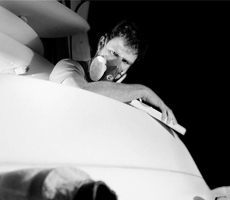
Drift Magazine
MS: Tell me about the eco boards you did for the Eden Project...
SC: Yeah that was a really interesting project and helped raise awareness of how toxic surfboards are. Ten years ago when Mark [Dickinson] and I started out shaping, we put a lot of time and our own money into researching more ecological ways to make surfboards and it’s quite frustrating that this hasn’t developed further. A lot of so-called ‘eco boards’ are not that ecological really, and the technology needs to come a lot further in terms of performance. It says a lot that the boards I build for myself are not ‘eco boards’, and I consider myself environmentally responsible. Saying that, we can’t keep using products that are made from petro-chemicals. The linseed oil resin is really good, but difficult to work with. Polystyrene/epoxy materials have come a long way in terms of usability and epoxy releases at least 50% less VOC’s into the atmosphere than polyester, making it safer for the workers and the environment. I am constantly looking for new ideas and materials to lessen the impact of the boards that we produce. We are currently looking into the viability of having someone produce recycled fins for us. Any new material has to at least match, if not out-perform the current standard, be competitive in price and be necessary to the market. I haven’t yet found a satisfactory replacement for polyester resin and polyurethane blanks on the Empire boards, so I’m working on the Rolls Royce principle of building less but making them last. Hopefully people will still be riding and enjoying the boards that I am building now in 30-40 years’ time.
